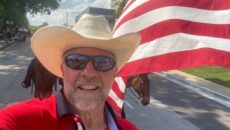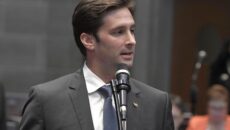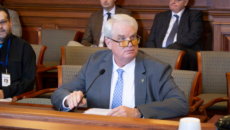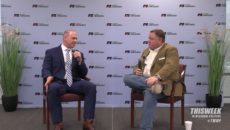JEFFERSON CITY, Mo. – With the presidential election looming, Reps. Tony Dugger, R-Hartville, and Jeremy LaFaver, D-Kansas City, have offered what they feel is the most impactful action Missouri has offered to the national conversation since it lost its status as a swing state in 2008.
Dugger and LaFaver each presented to the House Elections Committee Tuesday morning their versions of legislation that would make Missouri the 12th state to join the National Popular Vote Interstate Compact. The compact would effectively use the Electoral College to initiate a national popular vote for president by changing the way each state’s Electors vote for the office.
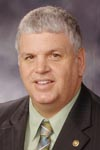
Dugger believes this will help increase voter turnout, not only in Missouri, but across the country. He says it will make votes in each state more meaningful because Democrats in states like Texas and Republicans in states like California, effectively marginalized members of the electorate, would have an equal say in elections as the highly coveted swing voters in Ohio and Florida.
“How many more people would turn out to vote if they knew their vote was actually going to be counted?” Dugger testified. “I think the fact that more people participate in the process can’t be a bad thing. And I think this makes more people vote in the process.”
The process would switch the manner of dividing how Electors should vote from the winner-take-all state popular vote total to the national popular vote. A more in-depth explanation of the process and the bills can be read here.
However, a few representatives, namely Reps. Shamed Dogan and Jason Chipman, took exception to the compact, arguing that it could force candidates to more populated areas, that it altered the intent of the Founding Fathers, that it was an over reaction to Missouri’s current status as a swing state. Dogan specifically voiced his fears that potentially putting Electors from the state at odds with a state’s voters, if the nation and the state vote different ways, that it was effectively a devaluation of their vote.
Trent England, a former Washington state legislator and advocate for the Heritage Foundation, called the idea of moving from the Electoral College unconstitutional.
“We know for sure this violates the original intent of Article II, Section 1. The Founders considered and rejected the direct election of the president,” England said. “It’s very dubious to suggest the electors belong to the legislature.”
However, Rep. Joe Don McGaugh, R-Carrollton, questioned the idea of the Electoral College, commenting that no one had watch parties for the Electoral College but they did for the actual night of the election.
“People participate in presidential politics, people go out and vote for candidates,” McGaugh said. “Doesn’t the process we have now undermine that?”

